Reviews
John Carpenter
USA, 1994
Credits
Review by Megan Weireter
Posted on 09 October 2009
Source New Line Home Video VHS
Categories 31 Days of Horror VI
In the Mouth of Madness is outwardly a clever, slickly produced film typical of mainstream horror movies of the ’90s; it’s also a simultaneous homage to Lovecraftian storytelling and parody of the mass market appeal of Stephen King. But ultimately the film grapples with the very essence of horror itself. The reason scary stories are scary is because of the possibility that they could be real—and here, all the scary stories in the world are about to become real all at once. If the film is only partially successful, it’s because it can’t quite live up to the ambitions of its premise. No film could. Anyone who really loves In the Mouth of Madness - and despite its weaknesses, I admit that I kind of do love it - will crave a whole series of books just to flesh out the threads of the back story that John Carpenter couldn’t possibly have fit into a feature film.
The idea that one author’s books can drive the entire human race to extinction seems almost quaint, given our culture’s cynicism about reading in general. But Sutter Cane, we’re told, is no ordinary author. His pulpy horror novels are the bestselling books in history, the books upon which his publisher, Arcane Books, has built a business. (And just to dispense with the eye-rolling early on, special care is taken to point out that Sutter Cane far, far outsells even Stephen King.) But now Sutter Cane, always a reclusive personality anyway, seems to have actually disappeared without turning in his latest manuscript, and the publisher calls in John Trent, an insurance investigator and master detector of scam artists, to find him. Along with Cane’s editor, Linda Styles, Trent manages to find Cane in seclusion in Hobb’s End, the fictional New Hampshire town in which the books are set—except now the town and all its terrible history seem very, very real.
Trent takes great pride in the fact that he can’t be fooled and in his unflinching black-and-white approach to reality. His debates with Styles about the nature of reality versus fiction make up the heart of the film—they prepare us to not trust anything that we’re seeing in the film. “A reality is just what we tell each other it is,” Styles points out, and even more presciently, “Sane and insane would easily switch places if the insane were to become the majority.”
As Trent starts to read Cane’s novels, his nightmares become so frequent and so tangled up with his real life that there’s a part of him that begins to believe her. Early on, Carpenter surprises us with some good fake-out dream sequences that train us to question everything we see in the film. But Trent doesn’t learn quite as quickly as we do, and he protests that the evil unfolding around him is just an elaborate scam far past the point when anyone else would have surrendered. It takes him the length of the movie to realize how wrong he’s been—and by that point, the entire narrative structure of the film he’s in has been thrown into question. We can’t know, really, what happens to these characters or to the world. Carpenter allows the line between fantasy and reality to remain tantalizingly unclear up to the very end.
It’s a smart premise and a good script, all of it rich with possibility and existential angst. The film’s main problem is really one of scale. It’s just difficult to cram several bestselling novels’ worth of scares into one feature-length film, especially when the novels so obviously rely on a pretty rich mythos. So when people talk about how scary Cane’s books are, we basically just have to believe them. When people read Cane’s books, we see a whip-fast montage of blood-soaked axes and other generically horrifying images set to scary music and screaming, but there’s nothing particularly special about any of it (except that the books make their eyes bleed, which is neat). We are given to understand that Cane’s books are kind of like Stephen King’s and kind of like H.P. Lovecraft’s, and any familiarity you have with those authors will help you fill in some holes, but this is a problem too—the horror movie clichés that those writers helped popularize, like creepy little children and paintings that change and town mobs armed with rifles, are all doled out as a kind of cinematic shorthand so that we can economically put the pieces together. It could have worked had the film followed its fleeting interest in parody a bit further, but it’s not really enough of a parody to get away with this completely.
In fact, the scenes in Hobb’s End all leave you with a sense that you’re not getting the full story. Trent and Stiles, who have read Cane’s books, help fill us in as much as time allows. They recognize elements of the town that are note-perfect, including the incongruous church in the center of town. The church is black, huge, and architecturally ridiculous, sitting as it does in a quaint New England hamlet (however haunted it might be) like Hobb’s End. You can bet that a church this over the top is an evil church. “This place had once been the seat of an evil older than mankind and wider than the known universe—it was a place of pain and suffering beyond human understanding,” Trent reads aloud from one of Cane’s novels. It looks scary, and Cane says it’s scary, so therefore it’s where evil lives. And of course this is where they find Cane himself, playing demonic creator of his evil world, and from here on out Cane does seem to be calling the shots.
Everyone has movie pet peeves, and one of mine is The Evil—that vague, creeping, meaningless Evil that lies at the heart of lazy horror stories. How many movies have you seen in which all the horror is traced back to The Evil? It’s possible to make this trope work, but it’s much more frequently used when a storyteller can’t come up with anything better. “The Evil” is not an answer to a question—it opens up its own set of questions about its very nature. So it irks me that In the Mouth of Madness relies on The Evil a little overmuch. Yes, after all the vague talk of something “infecting the children” and so forth, we eventually glimpse some slimy tentacles trying to break through a gigantic door in the Evil church, but what creatures they belong to and where they came from remain mysteries. (I recognize that tentacle-driven Evil is very Lovecraft, but this isn’t a Lovecraft story—this is Cane’s, and all I can gather from context-free tentacles is that Cane is kind of a hack.) The ambiguity is particularly striking in a film that respects its audience as much as this one does, that wants to make us question the very nature of objective reality—and yet asks us to continue to believe in a simplistic good-versus-evil kind of world, a world in which a purely, unquestionably Evil force can even exist.
But since this is John Carpenter - a director who had a hand in creating some of our beloved contemporary horror clichés - I can only resist for so long before I buy into this crazy psychological horror show. After all, it’s Carpenter, not Sutter Cane, who’s really manipulating us here, and each new manipulation is a delight. Even the movie’s silliest moments - the scene in which Trent cuts out seemingly random pieces of book covers to form a map of New Hampshire, the scene in which the entire world briefly gets a blue filter treatment, pretty much every scene featuring Charlton Heston as the president of the publishing house - are steeped in Carpenter’s sense of humor, which makes what could have been a rather dour, serious film more of a genial puzzle. I wonder if part of the joke of In the Mouth of Madness is that Sutter Cane really is a hack, and the truly scary part is not so much that the world is descending into chaos, but that that chaos is all the vision of a bad artist. But whether they’re good or bad, In the Mouth of Madness posits that all stories have the power to fundamentally change humanity just by twisting the way we see the world. It’s a horror movie that mulls over what’s so special about horror movies—which is why it should be of interest to any horror fan.
More 31 Days of Horror VI
-
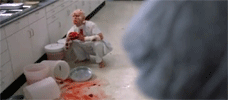
From Beyond
1986 -
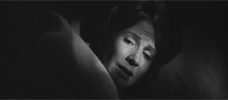
The Haunting
1963 -
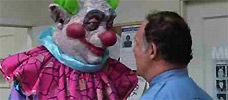
Killer Klowns from Outer Space
1988 -

Shock ‘Em Dead
1991 -

Critters
1986 -
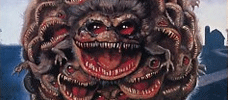
Critters 2
1988 -

The Fall of the House of Usher
1928 -

Jonestown: The Life and Death of Peoples Temple
2006 -

In the Mouth of Madness
1994 -
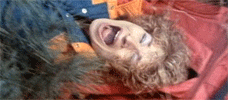
Winterbeast
1991 -

Black Roses
1988 -

Needful Things
1993 -
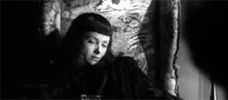
The Seventh Victim
1943 -
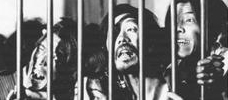
A Page of Madness
1926 -
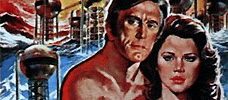
Holocaust 2000
1977 -
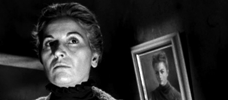
The Man and the Monster
1958 -
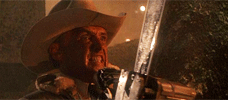
The Texas Chainsaw Massacre 2
1986 -

Trick or Treat
1986 -

Single White Female
1992 -
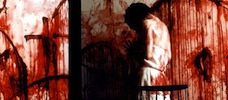
Trouble Every Day
2001 -
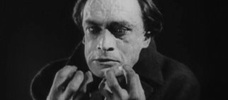
The Hands of Orlac
1924 -
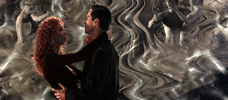
The Devil’s Advocate
1997 -
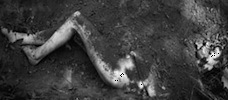
Nocturne
1998 -
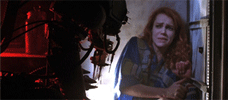
Hardware
1990 -
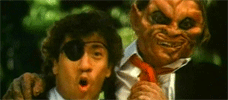
Hard Rock Zombies
1985 -

The Slumber Party Massacre
1982 -
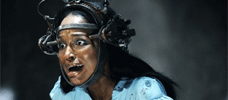
Saw VI
2009 -
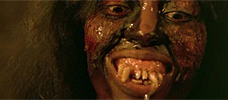
Zombi 4: After Death
1988 -

The Uninvited
1944 -

Hausu
1977
We don’t do comments anymore, but you may contact us here or find us on Twitter or Facebook.



